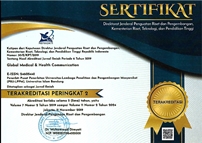Correlation of Midwives’ Knowledge about COVID-19 to Anxiety in Providing Care during COVID-19 Pandemic
Abstract
The increasing incidence of COVID-19 cases caused anxiety for medical workers. Knowledge about COVID-19 is an element that works on medical workers' anxiety levels, including midwives. This study aimed to analyze midwives' knowledge about COVID-19 to the midwives' anxiety in providing midwifery care during the COVID-19 pandemic. This correlational analytic study was conducted between August and October 2021 in RSUD Kabupaten Kediri. A self-administered questionnaire containing knowledge and Zung Self-Anxiety Rating Scale questions was distributed to 45 respondents to complete. The correlation between midwives' knowledge about COVID-19 in midwives' anxiety was examined using Kendall's tau correlation test. The outcomes pointed out that most respondents had good knowledge of approximately COVID-19 (89%), and most of the respondents had moderate anxiety (84%). The analysis showed that there had been a correlation between knowledge about COVID-19 to the anxiety of midwives in providing care. The correlation coefficient value of −0.235 with a significance level of 0.036 indicated that the better the knowledge, the lighter the anxiety of the midwives. Therefore, it's essential to increase the understanding of midwives about COVID-19 and to review other factors that can affect the anxiety of midwives in providing care.
Keywords
Full Text:
PDFReferences
Prompetchara E, Ketloy C, Palaga T. Immune responses in COVID-19 and potential vaccines: lessons learned from SARS and MERS epidemic. Asian Pac J Allergy Immunol. 2020;38(1):1–9.
Phelan AL, Katz R, Gostin LO. The novel coronavirus originating in Wuhan, China: challenges for global health governance. JAMA. 2020;323(8):709–10.
Li X, Geng M, Peng Y, Meng L, Lu S. Molecular immune pathogenesis and diagnosis of COVID-19. J Pharm Anal. 2020;10(2):102–8.
Kementerian Kesehatan Republik Indonesia. Situasi terkini perkembangan novel coronavirus (COVID-19). Data dilaporkan sampai 8 Juli 2020 [Internet]. Jakarta: Kementerian Kesehatan Republik Indonesia; 2020 [cited 2021 October 6]. Available from: https://covid19.kemkes.go.id/document/download/mlwO8kkrJZ.
Kementerian Kesehatan Republik Indonesia. Situasi terkini perkembangan coronavirus disease (COVID-19). ). Data dilaporkan sampai 18 Juli 2021 [Internet]. Jakarta: Kementerian Kesehatan Republik Indonesia; 2020 [cited 2021 October 10]. Available from: https://infeksiemerging.kemkes.go.id/document/download/KpvOAkg63j.
Chen Q, Liang M, Li Y, Guo J, Fei D, Wang L, et al. Mental health care for medical staff in China during the COVID-19 outbreak. Lancet Psychiatry. 2020;7(4):e15–6.
Neto MLR, Almeida HG, Esmeraldo JD, Nobre CB, Pinheiro WR, de Oliveira CRT, et all. When health professionals look death in the eye: the mental health of professionals who deal daily with the 2019 coronavirus outbreak. Psychiatry Res. 2020;288:112972.
Brooks SK, Webster RK, Smith LE, Woodland L, Wessely S, Greenberg N, et al. The psychological impact of quarantine and how to reduce it: rapid review of the evidence. Lancet. 2020;395(10227):912–20.
Lai J, Ma S, Wang Y, Cai Z, Hu J, Wei N, et al. Factors associated with mental health outcomes among health care workers exposed to coronavirus disease 2019. JAMA Netw Open. 2020;3(3):e203976.
Alwani SS, Majeed MM, Ramzan Z, Rauf S, Syed MS, Shah SH, et all. Evaluation of knowledge, practices, attitude, and anxiety of nurses towards COVID-19 during the current outbreak in Karachi, Pakistan. PJPH. 2021;11(3):82–90.
Fadli, Safruddin, Ahmad AS, Sumbara, Baharuddin, R. Faktor yang mempengaruhi kecemasan pada tenaga kesehatan dalam upaya pencegahan Covid-19. J Pendidik Keperawat Indones. 2020;6(1):57–65.
Abdel Wahed WY, Hefzy EM, Ahmed MI, Hamed NS. Assessment of knowledge, attitudes, and perception of health care workers regarding COVID-19, a cross-sectional study from Egypt. J Community Health. 2020;45(6):1242–51.
Ahmed N, Shakoor M, Vohra F, Abduljabbar T, Mariam Q, Rehman MA. Knowledge, awareness and practice of health care professionals amid SARS-CoV-2, corona virus disease outbreak. Pak J Med Sci. 2020;36(COVID19-S4):S49–56.
Alrubaiee GG, Al-Qalah TAH, Al-Aawar MSA. Knowledge, attitudes, anxiety, and preventive behaviours towards COVID-19 among health care providers in Yemen: an online cross-sectional survey. BMC Public Health. 2020;20(1):1541.
Nemati M, Ebrahimi B, Nemati F. Assessment of Iranian nurses’ knowledge and anxiety toward COVID-19 during the current outbreak in Iran. Arch Clin Infect Dis. 2020;15(COVID-19):e102848.
Notoatmodjo S. Promosi kesehatan dan perilaku kesehatan. Jakarta: Rineka Cipta; 2012.
Dharmawati IGAA, Wirata IN. Hubungan tingkat pendidikan, umur, dan masa kerja dengan tingkat pengetahuan kesehatan gigi dan mulut pada guru Penjaskes SD di Kecamatan Tampak Siring Gianyar. J Kesehat Gigi. 2020;4(1):1–5.
Grishela VV, Khoris YH, Akbar F. Kajian tingkat pengetahuan Covid-19 terhadap sikap dan perilaku pencegahan penularan infeksi Covid-19 pada tenaga kesehatan di Puskesmas Sungai Durian tahun 2020 [Internet]. Charlottesville; Open Science Framework (OSF); 2020 [cited 2021 October 7]. Available from: https://osf.io/fhqw8.
National Health Service United Kingdom. Generalised anxiety disorder in adults [Internet]. Leeds: National Health Service United Kingdom; 2018 December 2018 [cited 2020 September 23]. Available from: https://www.nhs.uk/mental-health/conditions/generalised-anxiety-disorder/overview.
Puspanegara A. Pengaruh usia terhadap hubungan mekanisme koping dengan kecemasan ketika menjalani terapi hemodialisa bagi para penderita gagal ginjal kronik di Kabupaten Kuningan Jawa Barat. J Ilmu Kesehat Bhakti Husada. 2019;10(2):142–9.
Rayani D, Purqoti DNS. Kecemasan keluarga lansia terhadap berita hoax dimasa pandemi Covid-19. Realita. 2020;5(1):906–12.
Sunarti E, Ramadhan DA, Wigar S. Refleksi hasil survey ketahanan keluarga di masa pandemi COVID-19. Webinar The 14th IPB Strategic Talks COVID-19 Series: Mencegah Krisis Keluarga Indonesia di Masa Pandemi COVID-19 [video file]. 2020 June 25 [cited 2021 October 1]. Available from: https://www.youtube.com/watch?v=yxyVB3PIpjo.
Vibriyanti, D. Kesehatan mental masyarakat: mengelola kecemasan di tengah pandemi COVID-19. JKI. 2020;Spec No:69–74.
Amri SO. Hubungan pengetahuan tentang Covid-19 dengan tingkat kecemasan perawat di Instalasi Rawat Jalan RSUP Dr. M Djamil pada tahun 2020 [minor thesis]. Padang: Universitas Andalas; 2021 [cited 2021 October 6]. Available from: http://scholar.unand.ac.id/75343.
Herwawan YP, Siagian E. Faktor yang mempengaruhi tenaga kesehatan dalam upaya pencegahan dan pengendalian pandemi Covid-19. J Penelit Perawat Prof. 2021;3(4):683–92.
Danu VK, Ningsih OS, Suryati Y. Faktor-faktor yang mempengaruhi kecemasan perawat selama pandemi COVID-19 di Kabupaten Manggarai. JWK. 2021;6(1):21–31.
Kasmi K, Maemonah M, Nurjannah N. Gambaran spiritualitas orang dalam pengawasan (ODP) COVID-19 yang mengalami anxiety: sebuah studi fenomenologis. Al-Isyraq. 2021;4(1):1–14.
DOI: https://doi.org/10.29313/gmhc.v10i1.8883
pISSN 2301-9123 | eISSN 2460-5441
Visitor since 19 October 2016:
Global Medical and Health Communication is licensed under a Creative Commons Attribution-NonCommercial-ShareAlike 4.0 International License.






























.png)
_(1).png)
_(1).jpg)
